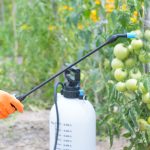Childhood cancer and pesticide exposure: A decade of research insights
 (NaturalHealth365) Extensive research spanning over a decade has shed light on the alarming connection between exposure to pesticides and other harmful chemicals and their detrimental effects on human health. The findings paint a grim picture of the long-term consequences that individuals face when they come into contact with these toxic substances.
(NaturalHealth365) Extensive research spanning over a decade has shed light on the alarming connection between exposure to pesticides and other harmful chemicals and their detrimental effects on human health. The findings paint a grim picture of the long-term consequences that individuals face when they come into contact with these toxic substances.
The studies’ results, conducted by leading experts in the field and published in the prestigious International Journal of Molecular Science, provide compelling evidence that the risks associated with pesticide exposure are particularly severe for children and young adults.
The alarming impact of pesticide exposure on children’s health
The long-term impact of pesticide use is alarmingly significant. Researchers have found that pesticides and other forms of environmental pollution are carcinogenic, with their potency increasing when exposure occurs at a young age. Early exposure to pesticides increases the risk of various cancers, including childhood cancer.
These conclusions are drawn from an analysis of 174 studies published between 2013 and 2023, examining the link between childhood cancer and environmental pollution. Most studies focused on the impact of pesticides and air pollution, revealing a strong relationship between childhood cancer and exposure to these pollutants.
Exposure to contaminants is positively associated with childhood cancer, with rates of 82% for pesticides, 79% for outdoor air pollution, and 84% for indoor pollution.
The analysis also showed a 33% positive association between pesticides and leukemia and a 27% positive association between air pollution and leukemia. Additionally, half of the studies found a positive relationship between pesticide exposure and the development of tumors in the central nervous system.
Of course, even though this is not the focus of this article, we must recognize the toxic threat posed by all the injections that children are subjected to – early in their lifetime. This is just too many toxins for a young immune system to handle. The results are clear: children loaded with too many toxins are at risk of allergies, autism, mental / emotional issues, and (yes) premature death.
Pesticide exposure is dangerous before and after birth
Aside from an increased risk for leukemia, early exposure to pesticides, be it prenatal or as a child, also heightens the risk for neuroblastoma. Neuroblastoma is a form of cancer that develops out of immature nerve cells throughout the body.
Those diagnosed with neuroblastoma find symptoms arise in the adrenal glands, chest, abs, neck, and spine. Neuroblastoma is most common in children younger than the age of 5, though it can also arise in older children.
It appears that prenatal exposure to pesticides is especially dangerous, considering that childhood cancer has an intrauterine origin. Intrauterine is a medical term referring to the growth of a baby within a mother’s womb.
Medical professionals believe genetic changes occur during the intrauterine phase, likely setting the stage for carcinogenesis and other mutations, including epigenetic alterations. Carcinogenesis refers to the development of cancer in which normal cells morph into cancer cells through rapid cell division.
Strategies to reduce your exposure to pesticides
It is in your best interest to reduce your exposure to pesticides even if you are not the parent of a little one or anticipating a pregnancy. Avoid pesticide-treated foods at all costs, opting for those of the organic variety.
Wash all vegetables and fruits before consumption. This isn’t a “perfect” solution … but, you will reduce the amount of chemicals you’re exposed to – if you buy non-organic produce. In addition, if possible, plant an organic home garden using non-toxic pest control methods such planting marigolds and chrysanthemums flowers around your garden or using diatomaceous earth.
Be mindful that chemical fertilizers, herbicides, and chemical residue can be tracked into the home. Encourage family and visitors to remove their shoes before entering the house to minimize exposure to those harmful chemicals.
The bottom line is, at this stage, no one can afford to stand by idly; proactive measures must be taken to minimize pesticide exposure and safeguard our health and environment for future generations.
Sources for this article include:



